Search the Special Collections and Archives Portal
Search Results

Slide of a crowd of protesters near the Nevada Test Site, April 1986
Date
1986-04
Archival Collection
Description
Color image of a crowd of protesters with the Lenten Desert Experience (also called the Nevada Desert Experience), a group demonstrating against nuclear testing. A few wooden crosses have been placed in the ground.
Image
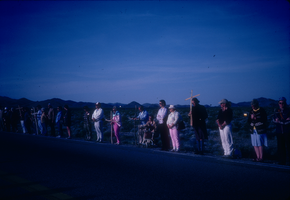
Slide of protesters lined up along the highway near the Nevada Test Site, April 1986
Date
1986-04
Archival Collection
Description
Color image of several protesters lined up along the highway leading to the Nevada Test Site to demonstrate against nuclear testing. Some are holding wooden crosses.
Image
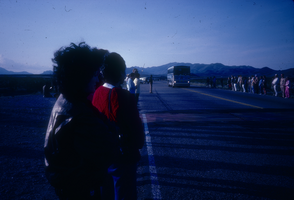
Slide of protesters lined up along the highway near the Nevada Test Site, April 1986
Date
1986-04
Archival Collection
Description
Color image of a bus approaching protesters lined up along the highway leading to the Nevada Test Site to demonstrate against nuclear testing.
Image
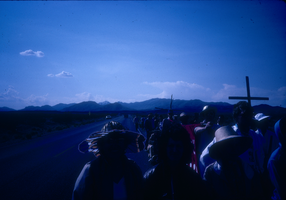
Slide of protesters marching along the highway near the Nevada Test Site, April 1986
Date
1986-04
Archival Collection
Description
Color image of several protesters marching along the highway leading to the Nevada Test Site to demonstrate against nuclear testing. They are part of the Lenten Desert Experience (also called the Nevada Desert Experience). Some are carrying wooden crosses.
Image
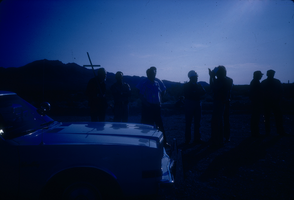
Slide of protesters demonstrating near the Nevada Test Site, April 1986
Date
1986-04
Archival Collection
Description
Color image of a crowd of protesters with the Lenten Desert Experience (also called the Nevada Desert Experience), a group demonstrating against nuclear testing. One is holding a wooden cross.
Image
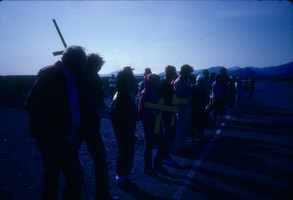
Slide of protesters with crosses demonstrating near the Nevada Test Site, April 1986
Date
1986-04
Archival Collection
Description
Color image of a crowd of protesters with the Lenten Desert Experience (also called the Nevada Desert Experience), a group demonstrating against nuclear testing. Some are holding wooden crosses.
Image
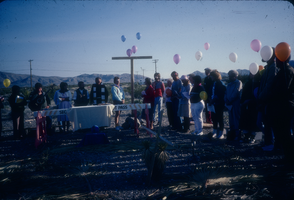
Slide of protesters with balloons at a demonstration near the Nevada Test Site, June 1986
Date
1986-06
Archival Collection
Description
Color image of several activists at a demonstration in the desert held by American Peace Test, a group protesting nuclear testing. Protesters are holding balloons that are to be released into the sky.
Image
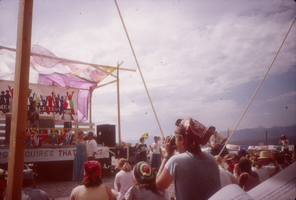
Slide of people on a stage at an American Peace Test demonstration near the Nevada Test Site, June 1986
Date
1986-06
Archival Collection
Description
Color image of people on and around a stage set up for a demonstration held on World Peace Day by American Peace Test, a group protesting nuclear testing. The stage has large banners and displays many international flags. One of the banners reads, "Nuremberg requires that we act."
Image
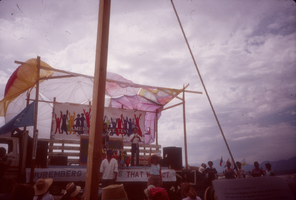
Slide of protesters on World Peace Day near the Nevada Test Site, June 1986
Date
1986-06
Archival Collection
Description
Color image of people on and around a stage set up for a demonstration held on World Peace Day by American Peace Test, a group protesting nuclear testing. The stage has large banners and displays many international flags. One of the banners reads, "Nuremberg requires that we act."
Image
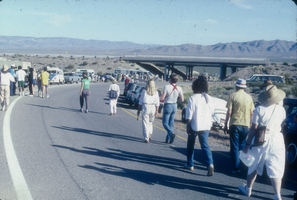
Slide of protesters marching along the highway near the Nevada Test Site, May 10, 1987
Date
1987-05-10
Archival Collection
Description
Color image of protesters walking along the highway by the Nevada Test Site at a demonstration held on Mother's Day in 1987 by American Peace Test, a group opposing nuclear testing.
Image
Pagination
Refine my results
Content Type
Creator or Contributor
Subject
Archival Collection
Digital Project
Resource Type
Year
Material Type
Place
Language
Records Classification
